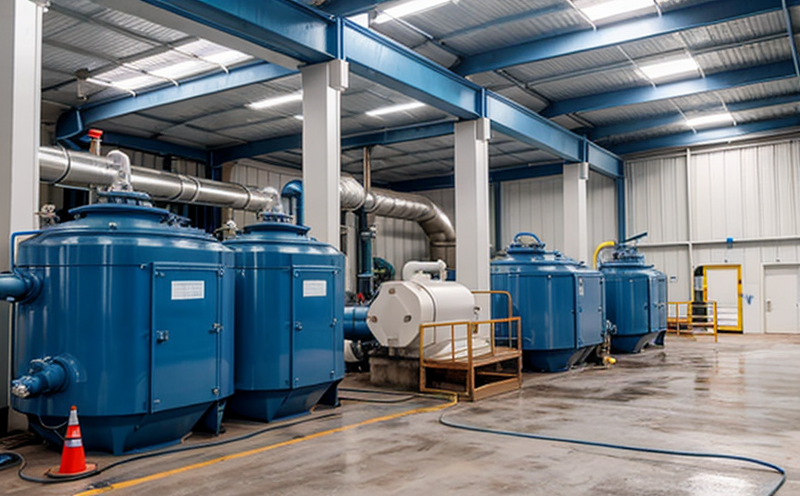ISO 14403 Nitrate Testing in Marine Wastewater
The ISO 14403 standard specifically addresses nitrate testing in wastewater, which is crucial for ensuring compliance with marine environmental protection regulations. This service focuses on the rigorous analysis of nitrate levels to ensure that ballast water and other treated wastewaters meet stringent international standards set by organizations such as the International Maritime Organization (IMO).
The process begins with the collection of a representative sample from the wastewater system being tested. The sample must be handled carefully to avoid contamination, ensuring accurate measurement results. Once collected, the sample is transported to our laboratory for immediate processing.
Our testing methodology adheres strictly to ISO 14403 guidelines which involve precise colorimetric analysis using a spectrophotometer equipped with appropriate cuvettes and reagents. This process allows us to measure nitrate levels accurately, providing reliable data that can be used to assess the effectiveness of wastewater treatment systems.
The results from this testing are critical for compliance with various international regulations including those outlined by the IMO’s Ballast Water Management Convention (BWM). By ensuring nitrate concentrations fall within acceptable limits, we help shipping companies avoid potential fines and reputational damage associated with non-compliance. Additionally, these tests play a vital role in maintaining ecological balance around ports and harbors.
Our team of experienced professionals uses state-of-the-art equipment calibrated to the latest standards to ensure consistent and accurate results every time. We pride ourselves on delivering timely reports that provide actionable insights into any discrepancies found during testing. This ensures our clients remain compliant with all relevant regulations while also contributing positively towards sustainable maritime practices.
In conclusion, ISO 14403 nitrate testing in marine wastewater is an essential service for maintaining environmental responsibility and regulatory compliance within the shipping industry. Our approach combines meticulous sample handling procedures with advanced analytical techniques to deliver reliable results that support informed decision-making processes regarding wastewater treatment effectiveness.
International Acceptance and Recognition
The ISO 14403 standard for nitrate testing in marine wastewaters has gained widespread acceptance among various global maritime bodies due to its robustness and accuracy. Many countries have adopted this as a benchmark for measuring nitrate levels in ballast water, making it a key requirement for compliance with international standards.
For instance, the International Maritime Organization (IMO) mandates that ships operating under its jurisdiction must comply with specific limits on nitrate concentration when discharging treated wastewater into coastal waters. Compliance ensures reduced environmental impact from excess nutrients entering aquatic ecosystems, preventing issues like algal blooms and oxygen depletion.
A number of leading maritime nations have incorporated ISO 14403 testing protocols into their national regulations, further enhancing its credibility as an industry standard. This includes major ports around the world which require proof of compliance before allowing vessels to enter or leave port areas.
Our laboratory is recognized for providing accurate and reliable ISO 14403 nitrate test results that are accepted by numerous regulatory bodies including IMO, EU directives, US Coast Guard guidelines, and several other international organizations. This recognition underscores our commitment to delivering high-quality services aligned with global standards.
Environmental and Sustainability Contributions
Reduces the risk of harmful algal blooms by minimizing nutrient runoff from treated wastewaters into coastal waters.
Aids in maintaining healthy marine ecosystems by preventing excessive nitrate accumulation which can lead to oxygen depletion affecting fish populations and other aquatic life.
Supports sustainable shipping practices that contribute positively towards reducing the ecological footprint of global maritime activities.
Our ISO 14403 nitrate testing service plays a significant role in promoting environmental stewardship within the marine industry. By helping clients ensure their wastewater treatment systems are effective at removing nitrate, we support efforts to protect fragile marine environments and promote long-term sustainability goals.
Competitive Advantage and Market Impact
In today’s competitive market, compliance with international standards is not just a necessity—it's a strategic advantage. By offering ISO 14403 nitrate testing services, we provide our clients with the assurance they need to stay ahead of regulatory changes and maintain their reputation as environmentally responsible operators.
Our expertise in this area allows us to offer comprehensive support that goes beyond simple compliance checks. We work closely with our clients to identify potential areas for improvement in their wastewater treatment processes, offering recommendations based on our findings. This proactive approach helps companies not only meet current requirements but also anticipate future trends and challenges.
By investing in ISO 14403 nitrate testing services from our laboratory, businesses can enhance their competitive positioning by demonstrating a commitment to environmental responsibility. In an era where public perception is increasingly influenced by corporate social responsibility (CSR), having robust evidence of compliance can significantly improve brand image and customer trust.
In summary, ISO 14403 nitrate testing offers more than just regulatory assurance; it provides valuable insights that drive operational efficiency, protect against reputational risks, and contribute meaningfully to environmental sustainability. These factors make our service a crucial asset for any company operating in the maritime sector looking to achieve both commercial success and ecological responsibility.





